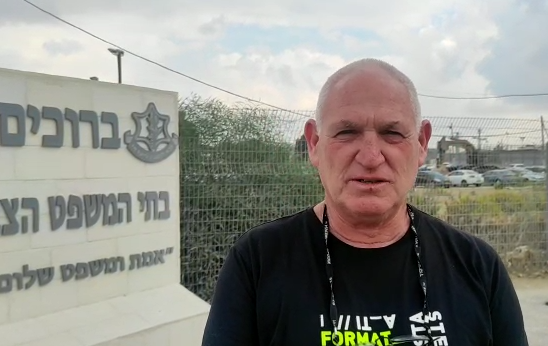Wednesday, October 20, 2021, 20:30 On Wednesday, October 20, the Ofer Military Court of Appeals rejected an appeal for leniency by Muhamed Ibrahim Kharsa, an abettor to the Barkan terrorist, and upheld his four-year sentence. In their decision, the judges emphasized the severity of Kharsa’s acts, noting that he was an adult when he committed the crime and is not related to the terrorist.
Kharsa was convicted of failure to prevent Ashraf Walid Na’alwa from carrying out the October 2018 Barkan terror attack in which Kim Levengrond-Yehezkel, Hy”d, and Ziv Hajbi, Hy”d, were murdered. During the lengthy trial, multiple plea bargains were considered and rejected. In August 2020, a plea bargain of 33 months’ imprisonment was rejected, and in October 2020, the Military Advocate General asked the judge to authorize a plea bargain of 36 months’ imprisonment, which was also subsequently rejected.
The Shomron Military Court sentenced Kharsa to four years’ imprisonment and imposed payment of 26,000 NIS in compensation on him in April 2021. Kharsa requested leniency, and at a July 25 hearing, the Military Advocate General and the abettor’s attorney filed a plea bargain of 40 months’ imprisonment, which was rejected several months later, as stated above.
In the decision rejecting the appeal, the President of the Military Court of Appeals, Judge Colonel Netanel Benisho, stated that Kharsa was a 25-year-old adult when he committed the crime and “even though he had more than enough time to prevent the attack, the appellant did not lift a finger, did not make even a weak attempt, to dissuade his friend from [carrying out the attack]. From examination of the indictment, the reverse picture appears. The interest shown by the appellant and the questions he asked were likely to have strengthened Na’alwa’s resolve,” wrote Judge Benisho.
Judge Benisho added that “the appellant is not a minor and is not a relative of the murderer. He was fully aware of his [Na’alwa’s] intentions, his detailed plans, the means he had, and the attempts he had made. He [Kharsa] did not do a thing to prevent the attack. On the contrary, he was willing to abet the perpetrator after the fact… It is only natural that the penalty of the appellant be significantly more stringent.”
In conclusion, Judge Benisho addressed bereaved families and victims of terror: “We must not ignore their voice, that of victims of terror, which is frequently silenced. Determining a suitable penalty for the defendant is a delicate and complex balance of all of the considerations mentioned.”
Rafi Levengrond, Kim’s father, sent a message to other bereaved families: “Fortunately for us the judge accepted our opinion, and upheld the penalty – four years. Although it is a ridiculous penalty, it’s preferable to a plea bargain of two and a half years. I hope that from now on, [the courts] will hand down a minimum of five years, as is written in the law. I call on everyone who has bereaved relatives or knows someone who was injured in a terror attack to do as I did: fight. It will help, and it will make a difference. If you do not fight, our situation will be bad.”
Honenu Attorney Chayim Bleicher, who is representing the victims’ families, welcomed the judges’ decision: “The [Ofer] Military Court of Appeals ruled that there must be stiff penalties for abettors who do not prevent attacks on Jews. This comes after an uncompromising struggle by the bereaved families, by Rafi, Kim’s father, who fought and did not agree to any plea bargain, to any leniency in the terrorist’s penalty.”
“Despite the plea bargain, in which the Military Advocate General reached an agreement with the abettor, the Shomron Military Court ruled that the terrorist will serve a four-year sentence. Despite the fact that the Military Advocate General sided with the appellant and agreed with the plea bargain, the Ofer Military Court of Appeals ruled that a penalty of less than four years is not appropriate, and imposed a four-year sentence.
“There is no doubt that the determined stance that the bereaved families took is leading a process. We know that four years is a small fraction of the time that a terrorist or an abettor should receive. We think that abettors to terror should be deported or receive a life sentence, and that they should not bargain for leniency. Under the current circumstances, there is no doubt that the concerted efforts by bereaved families contributes to the courts handing down stiffer penalties to terrorists.”
The attack occurred in the Barkan Industrial Park, on October 7, 2018. Ashraf Walid Na’alwa penetrated a factory and murdered Kim Levengrond-Yehezkel, Hy”d, the mother of a 16-month-old boy, and Ziv Hajbi, Hy”d, the father of three small children. Na’alwa then fled and evaded security forces for approximately two months. He was assisted by many abettors, but eventually was located and killed by security forces.

